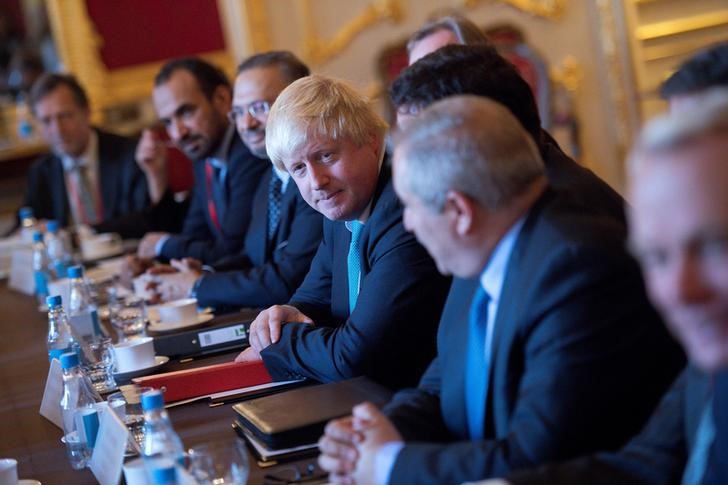By Robin Emmott
LUXEMBOURG (Reuters) – Britain and France sought to persuade the European Union on Monday to condemn Russia’s devastating air campaign in Syria and impose more sanctions on President Bashar al-Assad’s government, but met resistance from allies worried about alienating Moscow.
After a weekend of U.S.-led diplomacy that failed to find a breakthrough, EU foreign ministers met in Luxembourg to call for an end to the bombing of rebel-held east Aleppo, where 275,000 people are trapped, and to rush humanitarian aid into the city.
“The pressure (on Russia) must be strong,” France’s Foreign Minister Jean-Marc Ayrault said. “The more the European Union shows unity and determination, the more we can move forward in what is a moral obligation: to stop the massacre of the population of Aleppo,” he told reporters.
But the bloc is split over strategy towards Russia, its biggest energy supplier, with divisions about how harsh any criticism of Moscow should be and whether there was ground for also putting Russians under sanctions.
Britain and France want to put another 20 Syrians under travel bans and asset freezes, suspecting them of directing attacks on civilians in Aleppo, in addition to the EU’s existing sanctions list and its oil and arms embargo.
Britain has also raised the prospect of sanctions on Russians involved in the Syrian conflict, adding them to the EU’s list of 208 people and 69 companies that also includes three Iranians, diplomats told Reuters.
British Foreign Secretary Boris Johnson, who held talks with U.S. Secretary of State John Kerry on Sunday in London, said Russia’s Aleppo bombing “shames humanity” and called Russia the Syrian government’s “puppeteers.”
Britain and the United States say they are considering imposing additional sanctions on Assad and his supporters, without naming Russia.
Spain, which co-sponsored with France a U.N. resolution for a ceasefire that the Kremlin vetoed this month, would back Russian sanctions if they helped “bring Russia’s position closer to ours” acting Foreign Minister Jose Manuel Garcia-Margallo said.
European Union leaders will discuss Russia and possibly talk about new sanctions at a summit on Thursday. But Russia’s closest EU allies Greece, Cyprus and Hungary are against.
Austria, a transit point for flows for Russian gas to Europe, also voiced its opposition on Monday.
“The idea to have additional sanctions against Russia would be wrong,” Austria’s Foreign Minister Sebastian Kurz told reporters. “We do not need a further escalation,” he said.
Germany also appeared cautious, with Foreign Minister Frank-Walter Steinmeier rejecting adding punitive measures against Russia, although a German newspaper has cited sources saying that Chancellor Angela Merkel was in favor.
The West imposed broad economic sanctions on Moscow over its 2014 annexation of Crimea and its support for rebels in Ukraine.

British Foreign Secretary Boris Johnson (C) takes part in a meeting on the situation in Syria at Lancaster House in London October 16, 2016. REUTERS/JUSTIN TALLIS/Pool
EU PEACE ROLE?
U.N. Special Envoy Staffan de Mistura briefed EU ministers about the chances for peace after talks that took place without Europe in the Swiss city of Lausanne on Saturday. Diplomats meanwhile tried to craft a diplomatic statement on behalf of all 28 governments condemning Russian air strikes.
France and Britain want tough language, incensed by the Russian-backed campaign has killed several hundred people, including dozens of children, since the collapse of a truce brokered by Russia and the United States.
According to one draft seen by Reuters, EU ministers will condemn the “catastrophic escalation” of the Syrian government offensive to capture eastern Aleppo, where 8,000 rebels are holding out against Syrian, Russian and Iranian-backed forces.
They will say that air strikes on hospitals and civilians “may amount to war crimes”, calling on “Syria and its allies” to go to the International Criminal Court
Diplomats say the European Union will also call for a ceasefire with an observation mission, immediate access for an EU aid package announced on Oct. 2 and a bigger role for EU foreign policy chief Federica Mogherini.
With no military presence in the Syria conflict, the EU is searching for a role as peacemaker and could try to lead a process to bring regional powers including Saudi Arabia, Iran and Turkey to talks on a final peace settlement, if a ceasefire can be agreed and aid delivered first.
Paris is adamant Mogherini have no contact with Assad.
(Additional reporting by Alastair Macdonald and Philip Blenkinsop in Brussels; Editing by Dominic Evans)
 Russian President Vladimir Putin speaks during a news conference following the BRICS (Brazil, Russia, India, China and South Africa) Summit in the western state of Goa, India, October 16, 2016. Sputnik/Kremlin/Alexei Druzhinin via REUTERS
Russian President Vladimir Putin speaks during a news conference following the BRICS (Brazil, Russia, India, China and South Africa) Summit in the western state of Goa, India, October 16, 2016. Sputnik/Kremlin/Alexei Druzhinin via REUTERS
